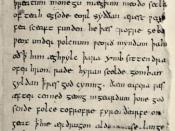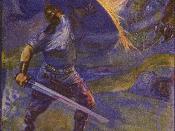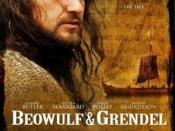The ancient Greeks left behind countless written marvels that secured their spot in history. Other great civilizations have recorded themselves via similar means; however, the less advanced nations of the world could not preserve their culture in any way besides their oral tradition. The tales which these people passed down from general to generation in order to immortalize something or someone extraordinary greatly reflects the values of the people who speak the stories. The uncanny warrior Beowulf epitomizes the Anglo-Saxon people through his display of the much-coveted qualities of loyalty and bravery, the backbone of Anglo-Saxon society.
The actions of the title character, Beowulf, represent his entire civilization's emphasis on loyalty. The respect given and received from Beowulf reflects the Anglo-Saxon appreciation of loyalty. After Grendel's ruthless seizing of the great hall of Herot, Beowoulf, to pay an emotional debt left by his father towards the King of Herot, Hrothgar, leaves for the great hall to "win the good will / Of [Hrothgar's] people" (366-367).
This blind appreciation of a well-renowned and honorable king as well as family fortitude would have to have meant a great deal for any well-off man such as Beowulf to abandon a prosperous life elsewhere and sail to the dark shores of the monster Grendel's wrath. Upon Beowulf's arrival at this new land, Beowulf and his anxious party of men are greeted with a request from King Hrothgar to formally dine with him. The team, instead of simply heading for the infected hall of Herot to grasp the spoils of their great warrior leader, agrees to Herot's request out of the utmost respect for the king. Ruffian warrior and noble royalty dine together with Anglo-Saxon heritage keeping the odor of social class distinction unnoticed by those attending the dinner. Also, eventually, Beowulf and...



Unferth
when u said that it was unferth who helped beowulf defeat the dragon, it was not. it was really this dude named wiglaf
0 out of 0 people found this comment useful.